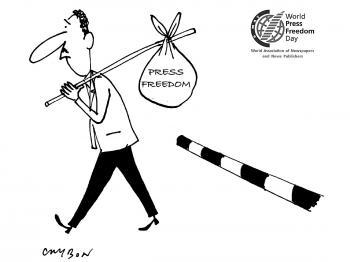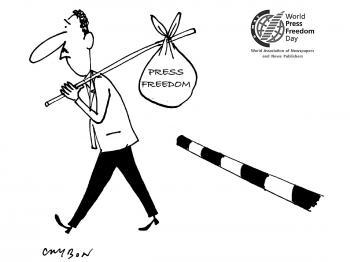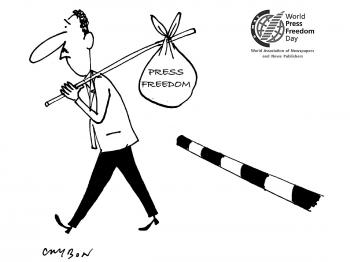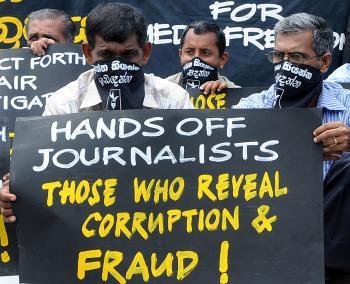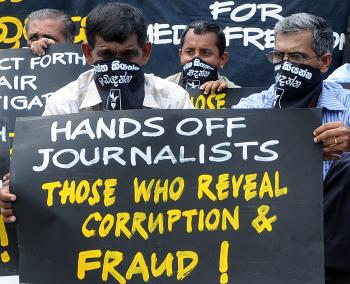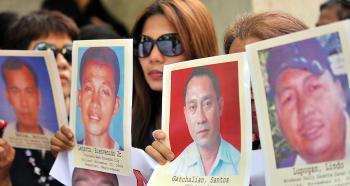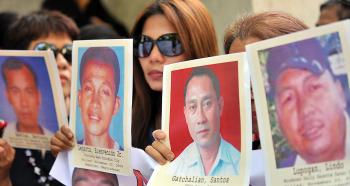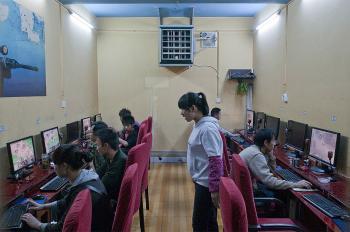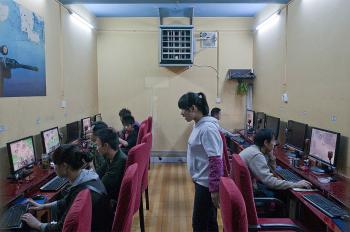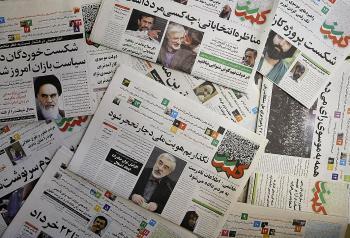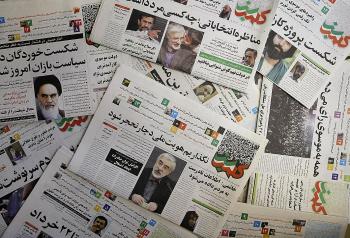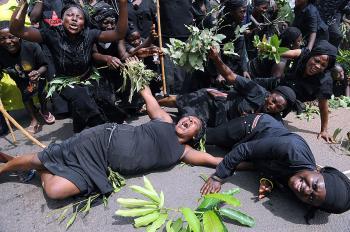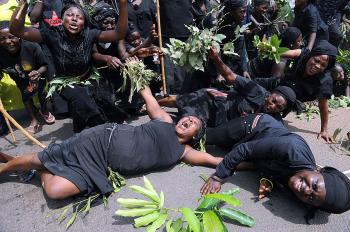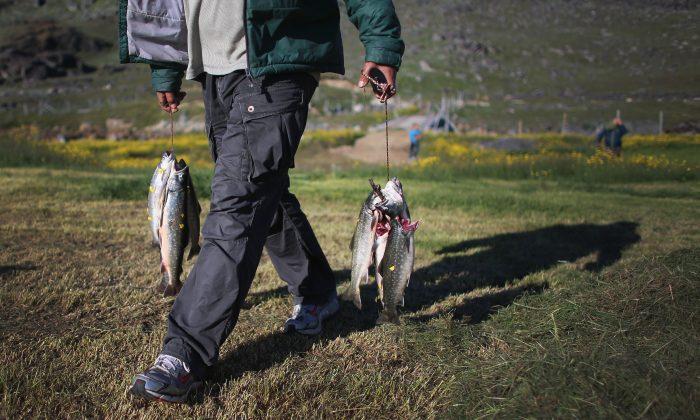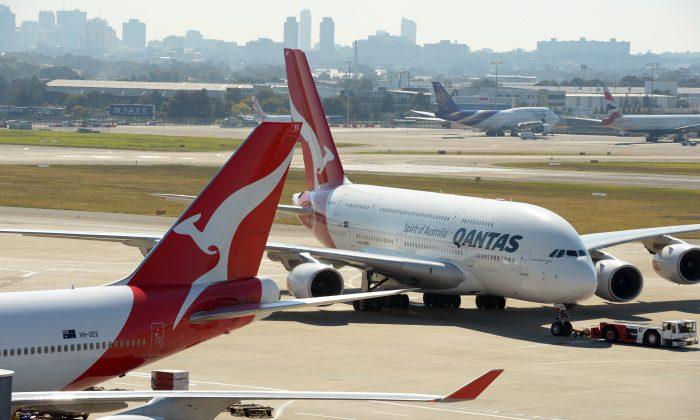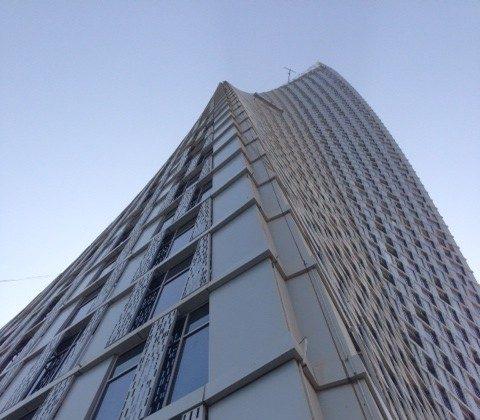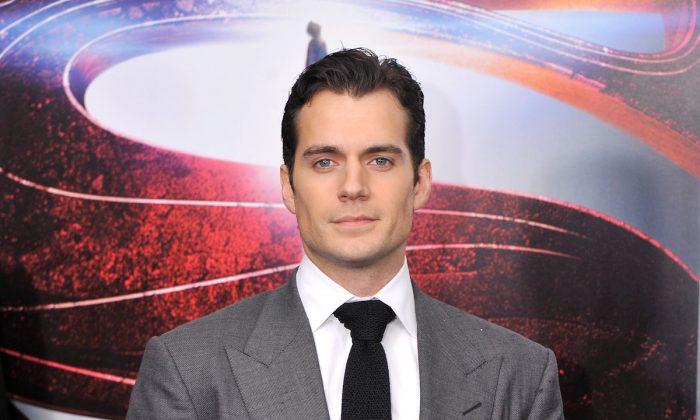In its annual survey, U.S.-based watchdog organization Freedom House claims that 2009 saw a decline of press freedom in almost every part of the world. In April alone, 17 journalists died violently, making it one of the bloodiest months on record, another rights group claimed.
The one minute of silence will mark “World Press Freedom Day,” which is held annually on May 3.
Jennifer Windsor, executive director of Freedom House, said that the decline in media freedom was “utterly disturbing.”
The organization assessed the media freedom of 196 countries in 2009, of which 69 were rated “free,” 64 were rated “partly free,” and 63 were rated “not free.”
Among the countries singled out as being the “worst of the worst,” were Belarus, Burma, Cuba, Equatorial Guinea, Eritrea, Iran, Libya, North Korea, Turkmenistan, and Uzbekistan.
Karin Deutsch Karlekar, who managed the study, said that there was serious concern about the backtracking of democracies including Namibia, the Philippines, Senegal, and South Africa in terms of freedom of expression.
“Journalists in many countries cannot do their job without fear of repercussions,” Karlekar said.
Last weekend, three reporters in Nigeria were murdered, bringing the total number of journalists killed in April to 17.
The International News Safety Institute, which supports journalists in troubled areas, reports that in the first four months of this year 42 journalists were killed—an increase of 13 percent since last year.
The organization, which is calling for the one minute of silence on World Press Freedom Day, claims that 2009 was one of the most violent years on record, with a total 133 journalists killed.
Its recently published report claims that over the past 14 years, some 1,500 journalists died on the story. In 8 out of 10 murder cases, no one was brought to justice, the organization said.
“This is a stark reminder of the terrible price we pay for our news around the globe,” said INSI Director Rodney Pinder.
Philippines
His thinking was that nobody would attack the convoy if there were so many journalists present. However, the massacre that occurred on the morning of Nov. 23, 2009—which left 57 people dead—has been claimed by media groups to be the deadliest attack ever on freedom of the press.
The Committee to Protect Journalists (CPJ) claims that the Philippines has a “culture of impunity,” which has led to the deaths of an increasing number of journalists.
“The government has allowed unpunished violence against journalists, most of it politically motivated, to become part of the culture,” said CPJ Executive Director Joel Simon.
“The Maguindanao massacre could serve as a turning point for the Philippines if its leaders can gather the political will to see that the perpetrators are brought to justice,” he added.
“If it is business as usual, we will continue to see journalists killed in the years to come.”
China
With sometimes seven or eight edicts each month, the 62-item list which was made public by the International Federation of Journalists (IFJ), shows how Chinese media are tightly regulated.
Banned subjects range from village riots, corruption allegations against the son of the president, as well as more ominous examples—such as even a single case of organ transplantation.
The regime has been accused of using organs removed from live dissidents—including members of the the Falun Gong spiritual group, House Christians, and Tibetans—as part of a commercial transplant business for foreign health tourists.
The IFJ said in a statement that the steady stream of official bans in China meant that it was “virtually impossible for local journalists who work in traditional or online media to receive the accreditation they need in order to conduct their profession.”
However the organization said that the Chinese communist regime appears to be losing control—particularly in the battle for information dissemination online.
Google made a high-profile exit from China after it emerged that the Gmail accounts of several human rights activists had been hacked by the security establishment.
In a recent speech in Washington, Tienchi Martin-Liao, president of the Independent Chinese PEN Centre, claimed that bloggers are increasingly using novel means to bypass online police.
“You can register several blogs and use pseudo names ... or have a blog outside China if you have the software to climb over the firewall. Another way is to avoid sensitive words or make modifications to the sensitive words by adding a number of extra letters.”
Iran
As a wave of protests engulfed the country, officials targeted journalists in a bid to prevent independent reporting on the crisis, rights groups claim.
Up to 35 journalists remain in prison, according to the IFJ, and three reformist newspapers have been closed down.
“The onslaught on media in Iran has been unrelenting since the disputed elections in June, last year,” said IFJ President Jim Boumelha.
“The [Iranian] government has sought to suppress independent media and to shut down all contacts with outside following unprecedented show of public defiance to the regime,” Boumelha said.
The Islamic regime has also sought to curb bloggers and Twitterati for independent reporting, an effort the IFJ have described as “forlorn.”
Nigeria
On Saturday, April 24 Edo Ugbagwu, a 42-year-old court reporter with the Nation newspaper was gunned down at his home in Lagos.
That same day, Nathan S. Dabak, 36, and Sunday Gyang Bwede, 39—both of whom worked for the Christian newspaper The Light Bearer—were stabbed to death while on their way to the city of Jos.
The area of the country has become infamous in recent months for clashes between Muslim and Christian groups.
“We are shocked by these senseless murders and the entire African journalist movement is deeply concerned by the levels of insecurity in which violent deaths can claim the lives of three colleagues in one day,” said Omar Faruk Osman, president of the Federation of African Journalists.
According to the most recent World Press Freedom Review, at least 14 African journalists lost their lives in connection with their work in 2009.
“African journalists faced a vast array of violations of their right to press freedom and freedom of expression,” the report said. “These included intimidation, harassment, threats, attacks, beatings, illegal detentions, arrests, and imprisonment. Their equipment was confiscated and destroyed; many were forced to flee their home countries or stop reporting.”
“Media houses were censored and sometimes shut down; their broadcast signals were jammed and copies of their publications seized. Newspapers, broadcasters, and journalists alike faced spurious lawsuits. Many reporters were slapped with criminal charges, often for alleged defamation and sedition, and very often for covering corruption or the activities of security forces.”
